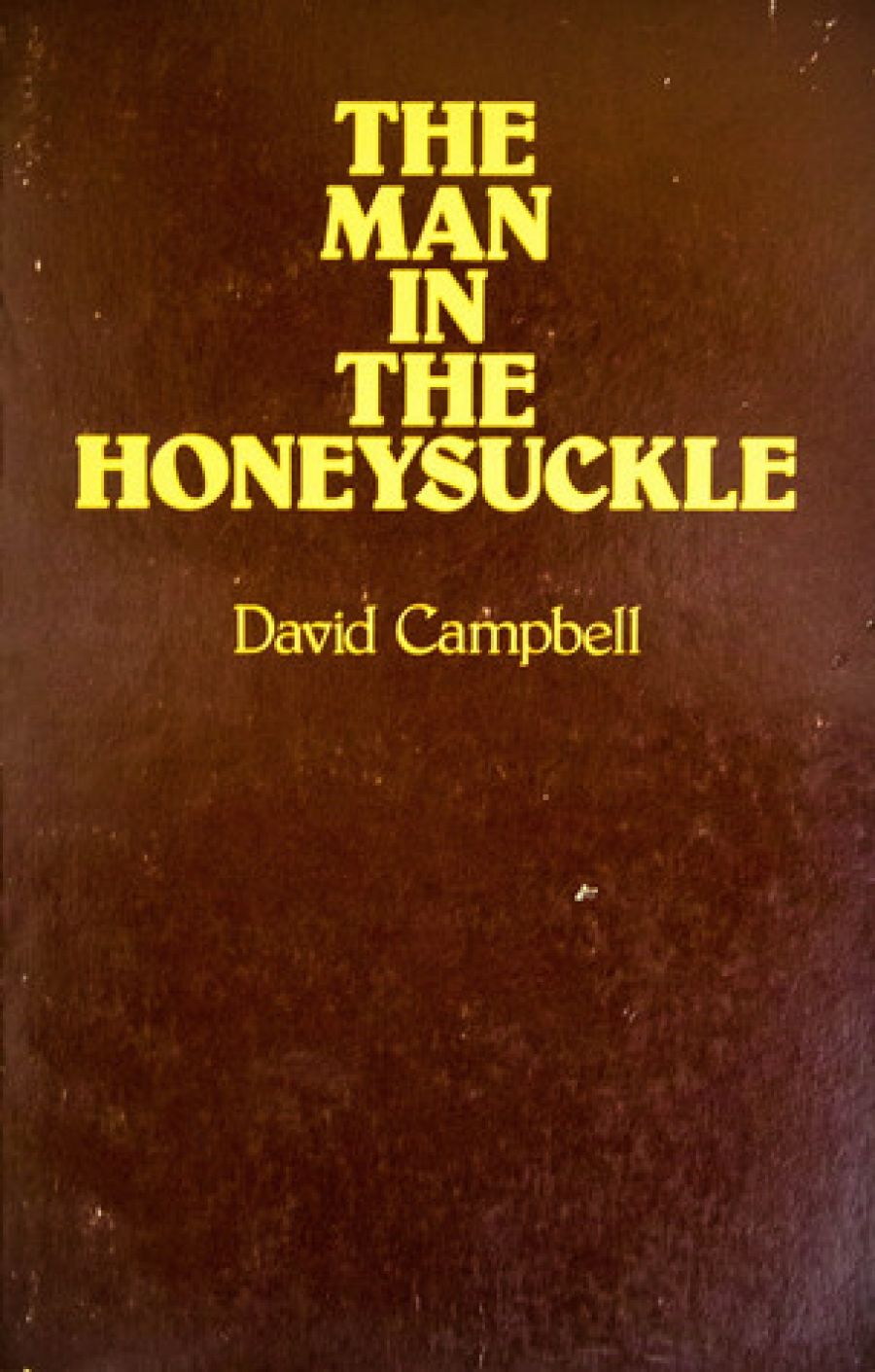
- Free Article: No
- Contents Category: Poetry
- Custom Article Title: Phillip Martin reviews 'The Man in the Honeysuckle' by David Campbell
- Review Article: Yes
- Article Title: A brave farewell
- Online Only: No
- Custom Highlight Text:
This book came out last November four months after David Campbell died, and represents (say the publishers) ‘the very last of his poems’.
Although of late I’ve read just about everything he published, there’s no space here to sum up his work. Besides, Geoff Page (ABR October 1979) has already taken a keenly perceptive look at the past ten years development and has also foreshadowed my comments on this last collection. Quite rightly he points to those poets (Lowell, Hughes, Zbigniew Herbert, Vasko Popa), in whom Campbell found reminders of ‘something he had long had to do’. Their poems, then, were like good parents, teaching their children not to imitate them but to assume their own identities. In The Man in the Honeysuckle, I especially note the influence of Popa: like him, Campbell in many poems cleans away all punctuation and yet the syntax sings clearly, so that we get a new version of the limpid poem we have always expected from Campbell.
- Book 1 Title: The Man in the Honeysuckle
- Book 1 Biblio: Angus & Robertson, 80 pp, $5. 95
At the first blast a lion
Sprang from a furnace
It crouched down on its paws
and become a range of mountains
At the second blast of the trumpet
The hilltops whitened
In a trance in a blond paddock
Cattle waited motionless
But despite the rich spareness of many poems the old ‘singing line’ is still to be found, as in ‘A Lark’:
Lost in a blue room like a dreaming girl
Practising scales. Then song -
Each song perfect and each song the same
As full of light as on the day it came
Unbidden in an unguarded hour. The bird
Opened its beak and sang the thing it knew
My love, my love - a bluer blue than blue.
The work was done. The song is always true.
Larks found no need to change.
What I find impressive in so many of these poems is the deftness with which a natural image is used suggestively, far more so than in the work of the 50s and 60s:
The hawk’s shadow slides
Through summer grass
Tracing contour and hollow
To pause fluttering below
The hawk like a lover.
The hawk from its hover
Drops on a small
Animal in its shadow,
In this act devours
And renews itself.
‘Deft’ is again the word for the easy capturing of impressions in a phrase, as when two fish float among debris ‘like canvas stones’, and (in the same poem) for the apt use of the colloquial: ‘a hawk homes in/Hooked on the smaller fish’.
Much has been said about Campbell’s delight in the natural world, and rightly so. It’s to be found in this book too, but as some of these passages show delight doesn’t blind him to the dark aspects of the human and natural cycles. The hawk with its shadow is hooked on death, and death, as we might expect in poems by a dying man, appears quite often here: but discreetly, and as Geoff Page says, ‘completely without complaint or self-pity’. David Campbell was dying of cancer: hence this poem, ‘Crab’:
The crab sidled out
From its hiding place
Beneath my shoulder-blade
Fending with one enlarged claw
It scuttled sideways
And settled in an outcropping elbow
It left tiptoe tracks
It, rite hard sands of the ulna
Pain broke on the white beach
The crab has reached my hand
In the dreck at the high-tide line
Look what I have found.
About death the poet can also be grimly wry:
Skeletons are very cold
Without flesh or skin
We huddle around the stove
Pulling our denim about us ...
Don’t touch me she says
Don’t dare touch me
With your chalky dead claw
I don’t know how we ever could
And instead of ‘confessional’ protest, Campbell in the title-poem offers a strange new vision of the ancient ritual death of the one for the many, all of them involved in the life-death process:
Flick
And the man in the honeysuckle
Crackles like pork, young leaves of flame
Clambering over the black framework.
We didn’t mean it, didn’t mean…
The farmers say it will be a good season.
Nearly everything I’ve quoted comes from the first half of the book (though in the second I must mention ‘The Red Telephone Box’ and the celebrated ‘Duchesses’). Why is this? Because while I agree that it would be foolish to think of Campbell as merely a ‘pastoral’ poet, I think that in this book, as in most of his work, the best poems are those which draw on country imagery, and in The Man in the Honeysuckle this imagery is most frequently early on. The more ‘surrealist’ effects of later poems leave me less satisfied.
While the collection as a whole has a marked unity (most noticeable in the subtle inter-echoing of the early poems), the fifth section, ‘Secret Lives (Poems and Imitations)’, does something to lessen this effect. But here too the best moments, for me at least, are those where the poet’s imagination turns once more to the country, as in the first two of ‘Three Looks at Lenin’ or in part of ‘The Secret Life of a Leader’.
All in all, though, this is a powerful, varied and compact book. Written though it was in illness, it shows no slackening of poetic energy but rather one more advance. It is a brave book: one to honour as well as to be grateful for.


Comments powered by CComment